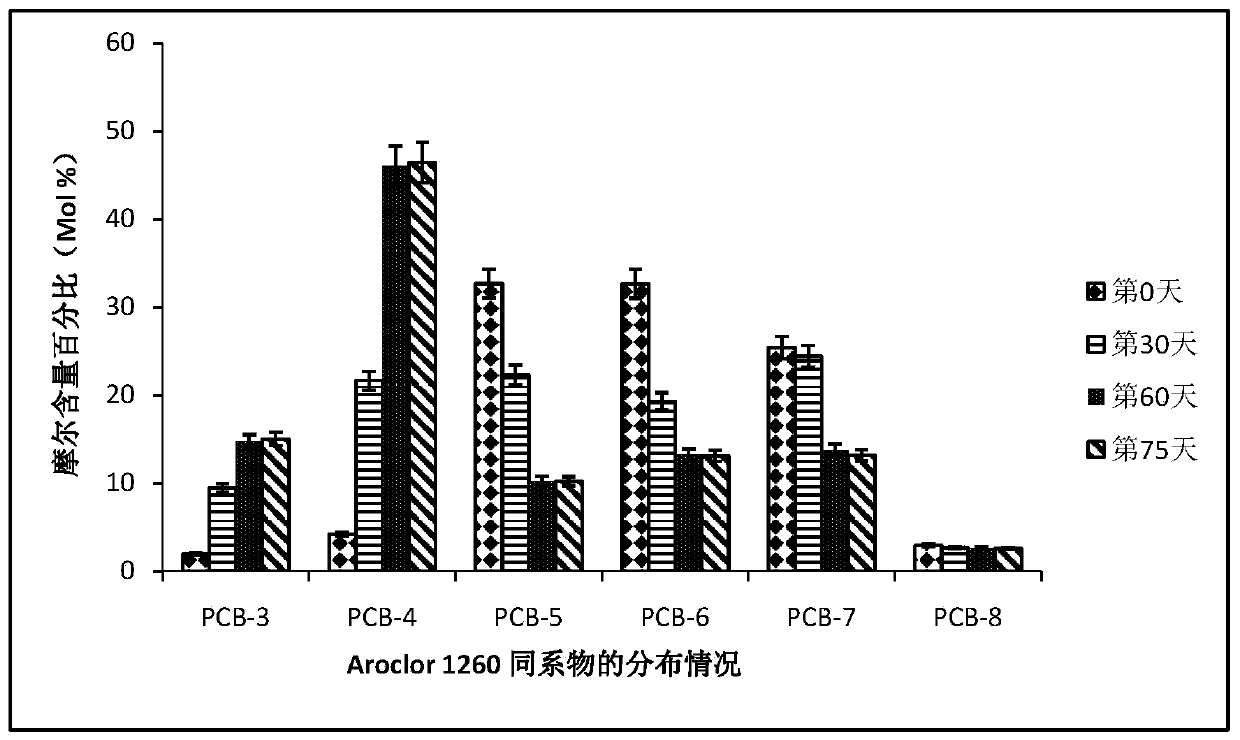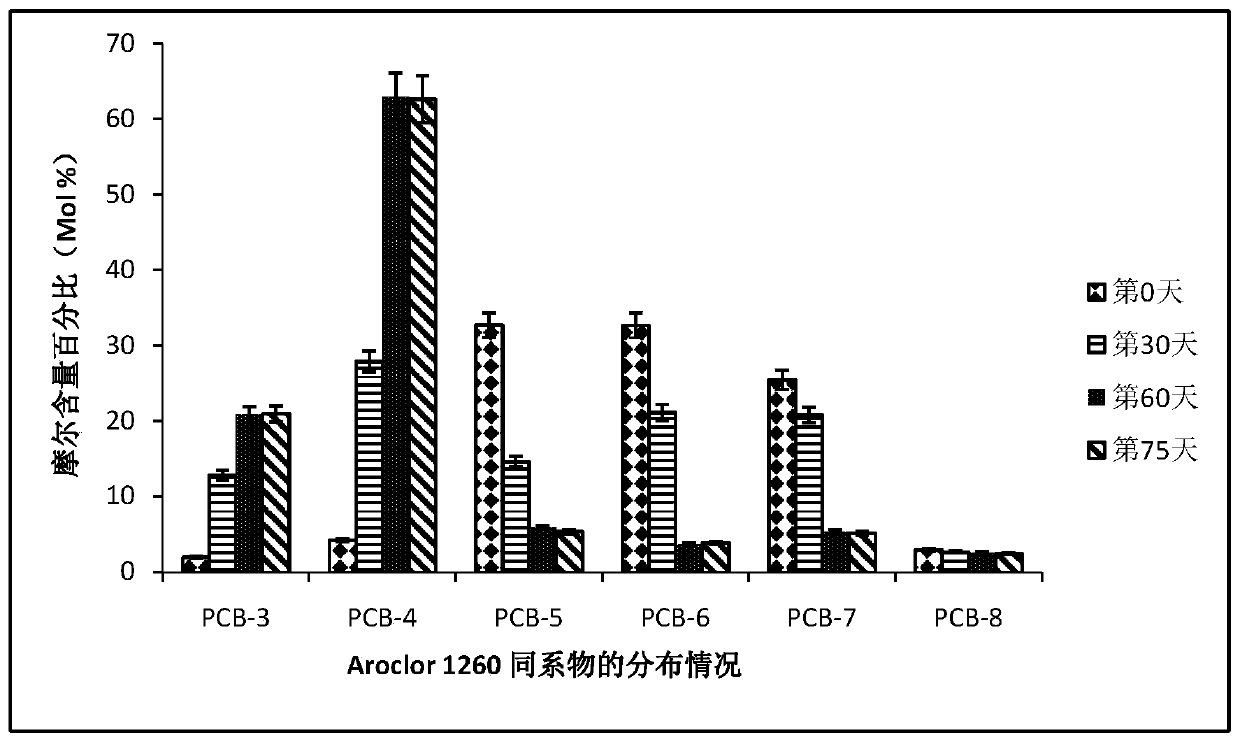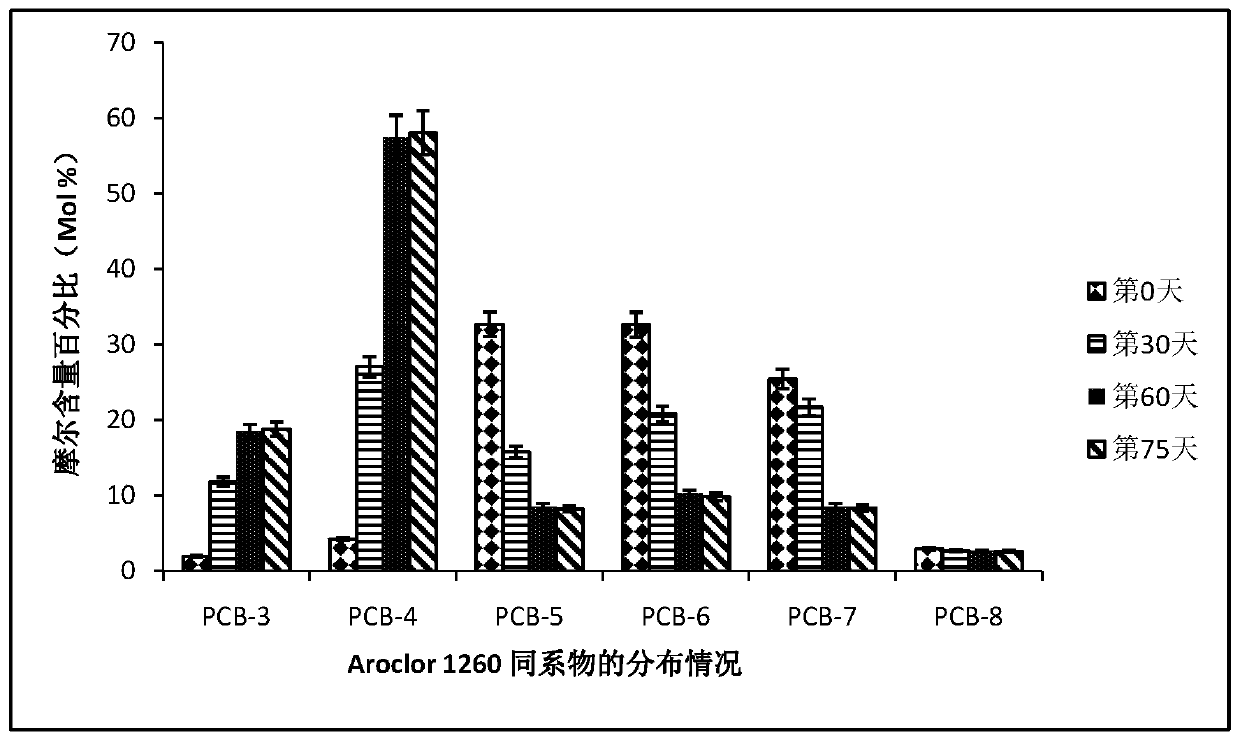Application of a kind of rape stalk biochar in mediated anaerobic dechlorination of polychlorinated biphenyls
A technology of polychlorinated biphenyls and rape stalks, applied in the field of biodegradation of organic matter, can solve problems such as time-consuming, limited, and cumbersome extraction methods, and achieve an environmentally friendly effect
- Summary
- Abstract
- Description
- Claims
- Application Information
AI Technical Summary
Problems solved by technology
Method used
Image
Examples
Embodiment 1
[0032] Example 1: A biochar degradation system for rape stalks, made by mixing the following components: 1 L of inorganic salt medium, 1 mg of anaerobic microorganisms, 1.5 ml of sodium lactate, 1 mL of vitamin solution, and 4 g of rape stalk biochar.
[0033] In terms of mass percentage, the anaerobic microorganisms are composed of the following bacterial species: Desulfuromonas sp. 43.5%, Desulfitobacterium sp. 23.6% Exiguobacterium sp. 3.8%, Citrobacter sp. ) 6.2%, Alkaliphilus sp. 5.1%, Pseudomonas sp. 1.8%, Dehalobacter sp. 6.5%, Bellilineasp. 3.6%, Dehalogenimonassp. 5.9%.
[0034] The formula of the inorganic salt medium is: NH 4 Cl 1.0g / L, CaCl 2 2H 2 O 0.05g / L, MgCl 2 6H2O0.1g / L, K 2 HPO 4 0.4g / L, Se / W solution 1mL / L, SL-10 trace element solution 1mL / L, pH7.2 MOPS buffer 10mmol / L, vitamin solution 0.02ml / L, water balance.
[0035] The composition of each liter of Se / W solution is: NaOH 0.5g, NaSeO 3 ·5H 2 O 3 mg, Na 2 WO 4 2H 2 O 4mg, the balance in water....
Embodiment 2
[0038] Example 2: A biochar degradation system for rape stalks, made by mixing the following components: 1 L of inorganic salt medium, 2 mg of anaerobic microorganisms, 2.5 ml of sodium lactate, 2 mL of vitamin solution, and 6 g of rape stalk biochar.
[0039] In terms of mass percentage, the anaerobic microorganisms are composed of the following bacterial species: Desulfuromonas sp. 45.2%, Desulfitobacterium sp. 25.8% Exiguobacterium sp. 5.3%, Citrobacter .) 6.5%, Alkaliphilus sp. 4.9%, Pseudomonas sp. 2.3%, Dehalobacter sp. 3.8%, Bellilinea sp. 3.4%, Dehalogenimonas sp. 2.8%.
[0040] Others are with embodiment 1.
Embodiment 3
[0041] Example 3: A biochar degradation system for rape stalks, made by mixing the following components: 1 L of inorganic salt medium, 1.5 mg of anaerobic microorganisms, 2 ml of sodium lactate, 1.5 mL of vitamin solution, and 5 g of rape stalk biochar.
[0042] In terms of mass percentage, the anaerobic microorganisms are composed of the following bacterial species: Desulfuromonas sp. 45.5%, Desulfitobacterium sp. 21.6% Exiguobacterium sp. 5.2%, Citrobacter sp. ) 8.1%, Alkaliphilus sp. 4.7%, Pseudomonas sp. 1.8%, Dehalobacter sp. 3.5%, Bellilinea sp. 4.1%, Dehalogenimonas sp. 5.5%.
[0043] Others are with embodiment 1.
PUM
 Login to View More
Login to View More Abstract
Description
Claims
Application Information
 Login to View More
Login to View More - R&D
- Intellectual Property
- Life Sciences
- Materials
- Tech Scout
- Unparalleled Data Quality
- Higher Quality Content
- 60% Fewer Hallucinations
Browse by: Latest US Patents, China's latest patents, Technical Efficacy Thesaurus, Application Domain, Technology Topic, Popular Technical Reports.
© 2025 PatSnap. All rights reserved.Legal|Privacy policy|Modern Slavery Act Transparency Statement|Sitemap|About US| Contact US: help@patsnap.com



